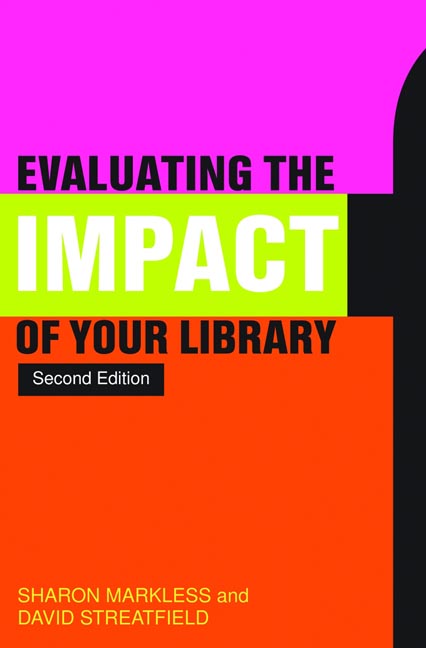Book contents
- Frontmatter
- Dedication
- Contents
- Introduction
- About the authors
- Impact and all that: use of some key terms in this book
- Part 1 The Context
- Part 2 Evaluating Impact
- Part 3 The Bigger Picture
- 11 Doing national or international evaluation
- 12 Where do we go from here?
- References
- Notes
- Index
- Evaluating and Measuring the Value, Use and Impact of Digital Collections
- Measuring Library Performance
- Miscellaneous Endmatter
12 - Where do we go from here?
from Part 3 - The Bigger Picture
Published online by Cambridge University Press: 08 June 2018
- Frontmatter
- Dedication
- Contents
- Introduction
- About the authors
- Impact and all that: use of some key terms in this book
- Part 1 The Context
- Part 2 Evaluating Impact
- Part 3 The Bigger Picture
- 11 Doing national or international evaluation
- 12 Where do we go from here?
- References
- Notes
- Index
- Evaluating and Measuring the Value, Use and Impact of Digital Collections
- Measuring Library Performance
- Miscellaneous Endmatter
Summary
This chapter moves beyond the practical aspects of impact evaluation covered so far. It puts a toe in the water by introducing some issues and offers further sources to take up if you are interested in finding out more.
What else do you need to think about if you want to take impact evaluation seriously? Evaluation can be too narrow, too shallow, too short term or undertaken too soon. We discuss these concerns below and then look at the scope for benchmarking around impact and at where all this work fits with the increasing emphasis on evidence-based library work.
Getting impact evaluation right
The process introduced in the main part of this book is intended to be practical and to meet the immediate impact evaluation needs of library service managers looking at accountability or seeking to develop their services (or to survive). To keep things as straightforward as possible, we have concentrated on evaluating the impact of parts of your service, especially those parts where you are trying to make a real difference to specific target groups of users or potential users. We have tried to take account of the unprecedented major change that is going on in the library world, especially in relation to electronic service provision and digital literacies, as well as the funding crisis occurring in many countries.
Even so, there is a danger that impact evaluation carried out by service managers can miss important parts of the picture. In particular, there is a risk that impact evaluation can be too narrow in its focus (so that the big picture is missed), too shallow in its execution, too short term (getting instant feedback can be easy but may also be very misleading), and it may miss important change altogether if it is done too soon. How can we avoid these traps?
Getting Beyond The Narrow Focus
Social capital
How can we look at the big questions about how libraries contribute to the cohesion and development of their communities or organizations? One way of exploring this theme is through the concept of social capital – defined as the stock of active connections among people in a community, or the trust, mutual understanding, and shared values and behaviours that bind the members of human networks and communities and make co-operative action possible (Cohen and Prusak, 2001).
- Type
- Chapter
- Information
- Evaluating the Impact of Your Library , pp. 207 - 220Publisher: FacetPrint publication year: 2012



